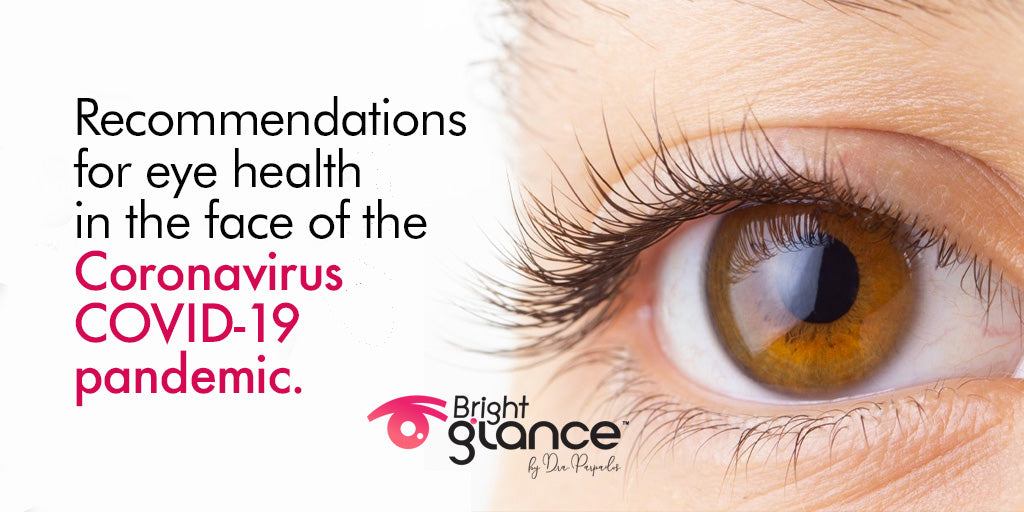Recommendations for eye health in the face of the Coronavirus COVID-19 pandemic

Given the dimensions that the Covid-19 coronavirus pandemic, declared by the World Health Organization (WHO), has taken, in this article we want to share a series of recommendations to keep ourselves protected. The most important are: wash your hands, avoid crowded public places and do not travel if you have a cough or fever.
A very important recommendation is to avoid touching your eyes. From our specialty, we want to address the special care that must be taken for them and thus succeed in this pandemic.
How does the spread of COVID-19 or coronavirus occur?
A person can get COVID-19 through contact with someone who is infected with the virus. The disease can spread from person to person through droplets from the nose or mouth, which are thrown off when an infected person coughs or exhales.
These droplets fall on objects and surfaces around the person, so other people can get COVID-19 if they touch these objects or surfaces and then touch their eyes, nose, or mouth. They can also be spread by inhaling droplets that a person with COVID-19 has spread by coughing or exhaling. So it is important to stay more than 1 meter (3 feet) away from an ill person.
Prevention is key in the COVID-19 pandemic, follow these recommendations rigorously:
-
Wash your hands frequently
Wash your hands often using an alcohol-based hand sanitizer or plenty of soap and water. Why? Washing your hands with an alcohol-based disinfectant or soap and water kills the virus if it is on your hands. -
Take respiratory hygiene measures
When coughing or sneezing, cover your mouth and nose with your elbow flexed or with a disposable tissue. Throw the tissue away immediately and wash your hands with an alcohol-based hand sanitizer or soap and water. Why? Covering the mouth and nose during a cough or sneeze prevents the spread of germs and viruses. If you sneeze or cough with your hands, you can contaminate the objects or people you touch. -
Maintain social distance
Keep at least 1 meter (3 feet) away from yourself and others, particularly those who cough, sneeze, and have a fever. Why? When someone with a respiratory illness, such as a 2019-nCoV infection, coughs or sneezes, they project small droplets that contain the virus. If it is too close, you can inhale the virus. -
Avoid touching your eyes, nose and mouth
Why? The hands touch many surfaces that may be contaminated with the virus. If you touch your eyes, nose, or mouth with contaminated hands, you can transfer the virus from the surface to yourself.
Tips for eye hygiene
1. Clean the eye area carefully and frequently.
The eyelids and eyelashes protect the eyes from drying out and foreign bodies. For this reason, these areas must be specially cared for, using special wipes and gels and carefully removing any makeup residues (in case we use them) and lizards when waking up. We suggest you use Gentle Touch micellar water from BrightGlance by Dra Párpados.
2. Take care of the environment where we are.
Both in our own home and in those places where we are going to spend many hours we must try to create a healthy environment: airy, well lit and without excess humidity.
3. Prevention factors at work.
Electronic devices can irritate our eyes, causing the dreaded eyestrain. With simple measures such as placing the computer about 40 centimeters away and tilted 20 degrees to avoid reflections, as well as lowering the brightness of the screens, we will reduce negative impacts on our eyes.
4. Rest your eyes.
We must get used to taking five-minute breaks every two hours of work at least. A simple eye massage or, even easier, looking out the window towards the horizon is the most effective way to avoid eye fatigue, as well as relaxing our mind.
5. Do not touch our eyes with dirty hands.
In the case of the transmission of COVID-19 this is vital. A matter of logic that we sometimes forget or do unconsciously and that can cause infections.
6. Protect our eyes from the outside.
Good sunglasses, preferably polarized, will effectively protect us from UV rays and other inclement weather, such as the wind.
If you have fever, cough and shortness of breath, get medical attention on time
Tell your health care provider if you have traveled to an area of Europe, the United States, or China where the presence of COVID-19 has been reported, or if you have had close contact with someone who has traveled from a region of special risk of contagion and have respiratory symptoms.
Why? Whenever you have a fever, cough, and shortness of breath, it is important to seek medical attention immediately, as these symptoms may be due to a respiratory infection or other serious condition. Respiratory symptoms with fever can have various causes, and depending on your travel history and personal circumstances, COVID-19 may be one of them.
